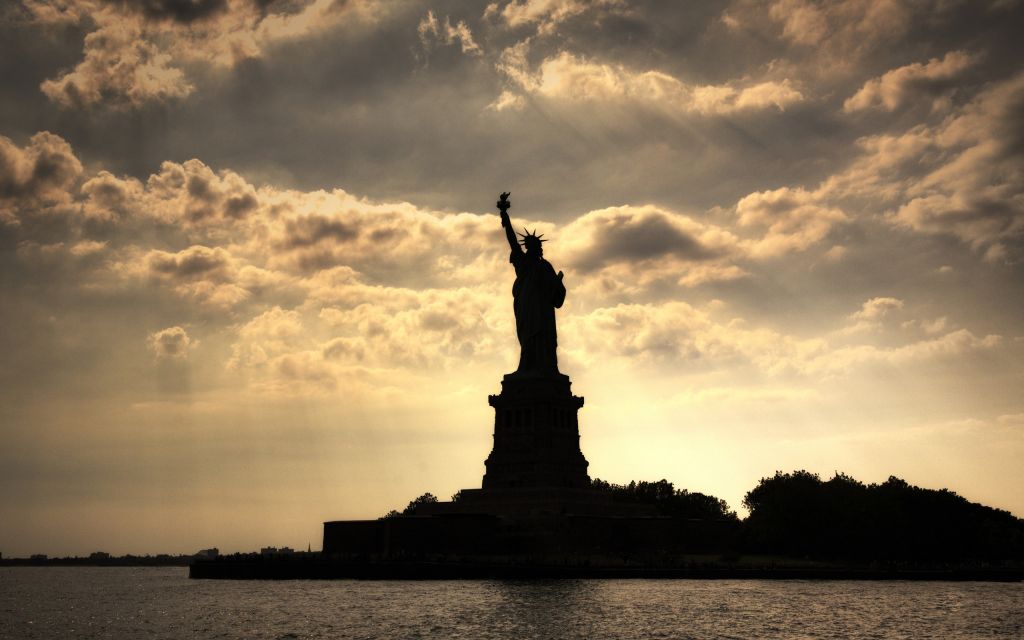Schoenfeld: An Immigrant’s Vision for This Country
A humane vision of the world and of people who need opportunity fits the best of American and Jewish values.
I am an immigrant.
Not precisely. I entered this country on a student visa. I had a scholarship to attend Washington University, and even though my uncle Saul, my father’s brother, a citizen of this country who came here long before World War I, extended an affidavit to assume responsibility for my welfare, I could not get a visa to enter this country as an immigrant.
I had to content myself to come as a student and hope for the best.
Get The AJT Newsletter by email and never miss our top stories Free Sign Up
While in the ghetto in Munkacs, just a few days before being driven by soldiers wielding weapons to the infamous trains, the family decided that should we survive the oncoming atrocities, we would meet in St. Louis, or at least we would contact Saul and move away from Europe and hope for a fresh start. All of us, including my 10-year-old sister, memorized my uncle’s address.
Alas, three of the five members of my family never returned. With my father, I returned to my hometown to learn that my city, based on the Tehran agreement, no longer belonged to Hungary or Czechoslovakia, but to the Soviet Union.
I never trusted Russia, regardless of whether it was a czarist country or the Communist Soviet Union. Throughout its history, it was a country where anti-Semitism was a part of the population; its ideals were spread by priests and politicians alike.
Two days after coming back to my town, I fled and ended up in Prague, hoping to continue my childhood dream of becoming a physician. Not even a year later, the formerly democratic Czechoslovakia, a country guided by the liberal ideology of Tomas Garrigue Masaryk, professor of sociology at Charles University and the nation’s first president, had dropped its constitution and become a satellite of the Soviet Union.
Once again, I packed my meager possessions and fled. I, like so many other Jews from various countries, sought refuge in hated Germany, now occupied by the United States and guided by its ideals. I became an employee of the United Nations Welfare Organization and worked for the American Jewish Joint Distribution Committee.
My first task was to seek entrance to the United States, and even after two years of waiting, the best I could do was to come as a visitor to continue my studies. Thanks to Congress and the leadership of President Harry Truman, however, I and all others whose homes fell behind the Iron Curtain were granted U.S. citizenship.
Over two years ago, to my surprise and delight, I received on my 90th birthday a letter from President Barack Obama, who wrote: “You are part of an extraordinary generation that, in the face of unspeakable evil, showed the courage to preserve and the strength to thrive.”
I migrated to the United States with thousands of other Holocaust survivors grateful for the opportunity to live in peace. We asked for nothing, merely for a chance to work, to succeed not only for our benefit, but also for the country’s. And we did.
But above all else, through my work I achieved the one thing that all people have a right to expect: human dignity.
The allocation of human dignity has been from time immemorial a fundamental belief of Judaism. I learned this principle early in life: “He who whitens another person’s face in public (that is, shames him) loses his portion in the world to come.”
In our belief, a human being, regardless of his economic status or degree of learning, is entitled, by virtue of being human, to dignity and humane treatment. The Founding Fathers knew this and stated it in one of the greatest documents ever produced, the U.S. Constitution.
One merely has to look at the treatise written by the great sage Maimonides on charity. He cautions us that, above anything else, we must take care when we practice tzedakah — the Torah-ordained justice commonly defined as charity — that we do not shame any person who, in his misfortune, has come to seek help from others.
Being poor does not cost someone his sensitivity. Many studies related to the Great Depression have shown that people who were down and out refused to seek help, lest by so doing they would lose dignity. I know, for I too have been in that position.
It distresses me greatly that a president of the United States, a country that was constituted by the flotsam and jetsam of the world, by the tired and poor huddled masses, should have so little humanity as to shame people who have to live in poverty and ignorance — none of it of their own making.
Our greatness should not be based on our wealth, but on our humane and moral perspective. Our greatness should be measured by our degree of commitment to establishing the peaceful world dreamed by Isaiah and Micah.
The greatness of our president should not be determined by the loudness of voice or the biting of insults — rather, by the wisdom to hearken to the quiet voice of the transcendent whisper declaring that our world is one, just as He is one, and each of us carries that sacred spark demanding justice and dignity.
I hope that this country will change and become honored not for the absence of bombastic shrieks that are emitted from the mouth of the hating, but for our decency based on a humane vision of the world.





comments